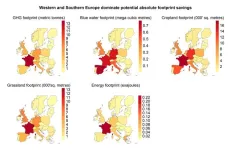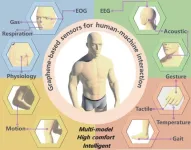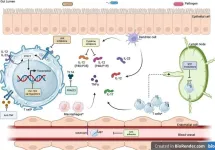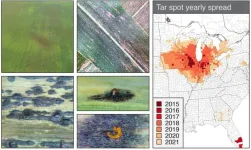(Press-News.org) Article in Nature Communications demonstrates that with 96% sensitivity, AI diagnostic MSIntuit™ CRC can rule out almost half of the MSS population of colorectal cancer patients unlikely to respond to checkpoint inhibitor therapy from additional screening.
Such AI-enabled solutions have the potential to improve lab efficiency, addressing global pathology shortages and reducing testing burden to match the right patients to the right therapies.
Paris and New York., 6 Nov 2023 – In a peer-reviewed study published today in Nature Communications, a team of scientists from French-American techbio Owkin and pathology labs in France present a blind validation of MSIntuit™ CRC, a first-in-class AI-driven digital pathology diagnostic developed by Owkin, as a pre-screening tool aimed at optimizing the precision of diagnosis and treatment of colorectal cancer.
With almost two million new cases and one million deaths worldwide in 2020, colorectal cancer is the third most common cancer globally and second highest cause of cancer mortality.
Microsatellite Instability (MSI) is a key genomic biomarker in colorectal cancer and represents ~15% of the overall CRC population. Recent clinical trials have shown that MSI phenotype has both prognostic and therapeutic importance, especially with the recent approval of immune checkpoint inhibitor (ICI) therapies. Those patients whose tumors show MSI, are considered likely to respond to ICI therapy and recommended for it. Conversely, ICI is not routinely recommended for those with tumors that are microsatellite stable (MSS). As a result, MSI testing is now recommended by consensus guidelines across the globe as a guide to best therapy.,,,
Prescreening tools that can remove the need to test all patients offer the opportunity to streamline the process and reduce pressure on laboratory staff and resources.
Today's study published in Nature Communications reveals that MSIntuit CRC can accurately rule out nearly 50% of MSS patients, while correctly classifying more than 96% of MSI patients, on par with current gold standard methods (92-95%). Such new solutions pave the way for an optimized screening workflow to screen more patients, faster.
“This new approach will have a direct impact on oncologist decision making and help bring the best treatment to patients sooner,” states Magali Svrcek, International expert in GI pathology, Professor at Saint Antoine Hospital, Sorbonne Université, AP-HP, France and co-last author of this publication. “It could also optimize costs and organization of MSI testing in pathology labs, especially for countries applying universal MSI screening.”
Meriem Sefta, Chief Diagnostic Officer at Owkin, said,
“With the increasing number of biomarkers to be routinely tested in clinical practice, the need for tools that can both ease bottleneck and resource pressures while ramping up biomarker testing is paramount.”
“Our solution represents the first step towards the development of an AI diagnostic that can identify actionable biomarkers from a single H&E slide used in clinical routine, pushing us closer to realizing a precision medicine future.“
A major strength of the study is the blind validation of the model on 600 consecutive CRC cases diagnosed across nine different pathology labs in the span of two years, thus reducing risk of selection bias, thanks to Medipath, the largest pathology lab network in France. This validation was also carried out across two different pathology slide scanners and performed consistently with a sensitivity of 96% and 98% respectively. This and other methodological approaches, such as the emphasis on sensitivity and specificity as performance markers, demonstrate a commitment to robustness of the AI model, all with the intention of ensuring the diagnostic is fit for clinical settings and generalizable across labs and geographies.
The full publication can be read here. To learn more about MSIntuit CRC and its availability visit www.https://www.owkin.com/msintuit-crc.
The MSIntuit™ CRC diagnostic tool represents a pioneering achievement by OWKIN. It is driven by patient-derived data, and it is designed to provide benefits back to patients.
About Owkin
Owkin is a techbio company that combines the best of human and artificial intelligence to ensure every patient gets the right treatment. By understanding complex biology through AI, we identify new treatments, de-risk and accelerate clinical trials and develop AI diagnostics. Owkin uses privacy-enhancing federation to access up-to-date multimodal patient data that unlocks AI’s potential to power precision medicine. We merge wet lab experiments with advanced AI techniques to create a powerful feedback loop for accelerated discovery and innovation.
Owkin founded MOSAIC, the world’s largest multi-omics atlas for cancer research.
Owkin has raised over $300 million through investments from leading biopharma companies (Sanofi and BMS) and venture funds (Fidelity, GV and BPI, among others).
END
Major study validates Owkin’s best in class AI diagnostic for colorectal cancer biomarker aimed at optimizing patient access to immunotherapy
In a peer-reviewed study published today, a team of scientists from French-American techbio Owkin and pathology labs in France present a blind validation of MSIntuit™ CRC, a first-in-class AI-driven digital pathology diagnostic
2023-11-06
ELSE PRESS RELEASES FROM THIS DATE:
Food waste prevention in Europe can generate major footprint savings
2023-11-06
New research shows that European food consumption draws unnecessarily excessively on global resources, which is why researchers are calling for political action. Many of the foods that are consumed in Europe are produced in countries outside Europe. Food loss – and waste later in the chain, (read more on waste terms below) – occurs along the food supply chain, from the primary agricultural sector in Europe or rest of the world, until it feeds mouths in Europe.
“Halving Europe’s food loss and waste, together with a redistribution of global food resources, could solve the challenges of food shortages in the ...
NIH grant expands UIC brain bank into citywide effort to study epilepsy, brain cancer
2023-11-06
A new virtual brain bank spanning five Chicago academic medical centers and led by University of Illinois Chicago will create a powerful new resource for clinical care and research on epilepsy, brain tumors and neurological disorders.
A $5 million grant from the National Institutes of Health will create a network of brain tissue research at UIC, Northwestern University, Lurie Children’s Hospital, Rush University and University of Chicago. The institutions will utilize a data platform developed at UIC called INTUITION that combines tissue data with clinical, functional, genetic and 3D imaging information to assist clinicians treating patients and help researchers better understand ...
Carbon-based sensors are poised to facilitate a seamless human-machine interface
2023-11-06
Interaction between machines and humans is paramount to the development of the new technologies of the metaverse, which are designed to augment the human experience through cloud computing and extended reality (XR). Graphene, a two-dimensional carbon material, has emerged as an ideal candidate for wearable sensor technology, paving the way for a new era of seamless human-machine interaction (HMI).
A team of material scientists led by Tian-Ling Ren from Tsinghua University in Beijing, China recently outlined the state of graphene-based HMI sensor technology ...
Chronic liver diseases: What new insights are there?
2023-11-06
Fatty liver diseases (FLD) have become a significant health concern worldwide, affecting millions. The two most common types of FLD are non-alcoholic fatty liver disease (NAFLD) and alcoholic-associated liver disease (ALD). NAFLD is associated with obesity, insulin resistance, and metabolic syndrome, while ALD is caused by excessive alcohol consumption. Both NAFLD and ALD can progress to liver fibrosis, cirrhosis, and, ultimately, hepatocellular carcinoma (HCC), a primary liver cancer with a poor prognosis.
Significant ...
Future therapies for managing inflammatory bowel disease
2023-11-06
Ulcerative colitis (UC) and Crohn's disease (CD) are chronic inflammatory bowel diseases (IBD) that affect the gastrointestinal tract. In recent decades, there have been significant advances in the understanding of IBD pathophysiology and the development of new treatments.
The International Organisation for the Study of Inflammatory Bowel Diseases (IOIBD) developed the Selecting Therapeutic Targets in Inflammatory Bowel Disease (STRIDE) programs, which recommend specific treatment goals for UC and CD in children ...
A joint research team from South Korea and the United States has identified a new gene classification system for gastric cancer
2023-11-06
- A multicenter study of the MD Anderson, Korea University, Yonsei University, and other institutions
- Establishing subtypes of gastric cancer classification to lay the foundation of personalized treatment
Professor Sang Cheul Oh of the Division of Oncology/Hematology, Department of Internal Medicine, Korea University College of Medicine, Professor Sang‑Hee Kang of the Department of Surgery, Korea University’s Guro Hospital, and Professor Sun Young Yim of the Division of Gastroenterology and Hepatology, Department of Internal Medicine, Korea University College of Medicine announced a new genetic classification system ...
MD Anderson Research Highlights: SITC 2023 Special Edition
2023-11-06
ABSTRACTS: 1534, 777, 1328, 1526, 1330, 545
HOUSTON ― The University of Texas MD Anderson Cancer Center’s Research Highlights provides a glimpse into recent basic, translational, and clinical cancer research from MD Anderson experts.
This special edition features oral presentations from the Society for Immunotherapy of Cancer (SITC) 38th Annual Meeting focused on scientific advances and breakthroughs in cancer immunotherapy from MD Anderson-led studies. Highlights include fecal microbiome transplants ...
Fossils tell tale of last primate to inhabit North America before humans
2023-11-06
LAWRENCE — The story of Ekgmowechashala, the final primate to inhabit North America before Homo sapiens or Clovis people, reads like a spaghetti western: A grizzled and mysterious loner, against the odds, ekes out an existence on the American Plains.
Except this tale unfolded about 30 million years ago, just after the Eocene-Oligocene transition during which North America saw great cooling and drying, making the continent less hospitable to warmth-loving primates.
Today, paleontologists from the University ...
It’s corn! It has the…spots? Researchers supply significant genomic insight into tar spot of corn
2023-11-06
First reported in 2015, tar spot is an emerging disease on corn that has rapidly spread across the United States and Canada, causing tremendous yield loss estimated at $1.2 billion in 2021 alone. Tar spot gets its name from its iconic symptoms that resemble the splatter of “tar” on corn leaves, but these spots are in fact brown lesions formed by the fungal pathogen Phyllachora maydis. This destructive pathogen is challenging to research because it cannot survive outside its plant host; therefore, little information is currently known about the mechanisms that contribute to its disease cycle including spore formation, reproduction, and plant ...
Incheon National University scientists develop new hydrogels for wound management
2023-11-06
Open wounds, whether caused by accidents or from medical procedures like surgery, require proper management to speed up healing and prevent infections. While sutures and staples are common wound closure methods, they can cause secondary tissue injuries, potentially leaking fluids and gases and requiring anesthetics. Tissue adhesive glues are a more attractive alternative but often suffer from toxicity and weak adhesion.
Fortunately, tissue adhesive patches offer an innovative solution. They allow precise control of adhesion and mechanical properties through adjustable polymeric compositions. These patches can also deliver ...
LAST 30 PRESS RELEASES:
Why does chronic back pain make everyday sounds feel harsher? Brain imaging study points to a treatable cause
Video messaging effectiveness depends on quality of streaming experience, research shows
Introducing the “bloom” cycle, or why plants are not stupid
The Lancet Oncology: Breast cancer remains the most common cancer among women worldwide, with annual cases expected to reach over 3.5 million by 2050
Improve education and transitional support for autistic people to prevent death by suicide, say experts
GLP-1 drugs like Ozempic could cut risk of major heart complications after heart attack, study finds
Study finds Earth may have twice as many vertebrate species as previously thought
NYU Langone orthopedic surgeons present latest clinical findings and research at AAOS 2026
New journal highlights how artificial intelligence can help solve global environmental crises
Study identifies three diverging global AI pathways shaping the future of technology and governance
Machine learning advances non targeted detection of environmental pollutants
ACP advises all adults 75 or older get a protein subunit RSV vaccine
New study finds earliest evidence of big land predators hunting plant-eaters
Newer groundwater associated with higher risk of Parkinson’s disease
New study identifies growth hormone receptor as possible target to improve lung cancer treatment
Routine helps children adjust to school, but harsh parenting may undo benefits
IEEE honors Pitt’s Fang Peng with medal in power engineering
SwRI and the NPSS Consortium release new version of NPSS® software with improved functionality
Study identifies molecular cause of taste loss after COVID
Accounting for soil saturation enhances atmospheric river flood warnings
The research that got sick veterans treatment
Study finds that on-demand wage access boosts savings and financial engagement for low-wage workers
Antarctica has lost 10 times the size of Greater Los Angeles in ice over 30 years
Scared of spiders? The real horror story is a world without them
New study moves nanomedicine one step closer to better and safer drug delivery
Illinois team tests the costs, benefits of agrivoltaics across the Midwest
Highly stable self-rectifying memristor arrays: Enabling reliable neuromorphic computing via multi-state regulation
Composite superionic electrolytes for pressure-less solid-state batteries achieved by continuously perpendicularly aligned 2D pathways
Exploring why some people may prefer alcohol over other rewards
How expectations about artificial sweeteners may affect their taste
[Press-News.org] Major study validates Owkin’s best in class AI diagnostic for colorectal cancer biomarker aimed at optimizing patient access to immunotherapyIn a peer-reviewed study published today, a team of scientists from French-American techbio Owkin and pathology labs in France present a blind validation of MSIntuit™ CRC, a first-in-class AI-driven digital pathology diagnostic









